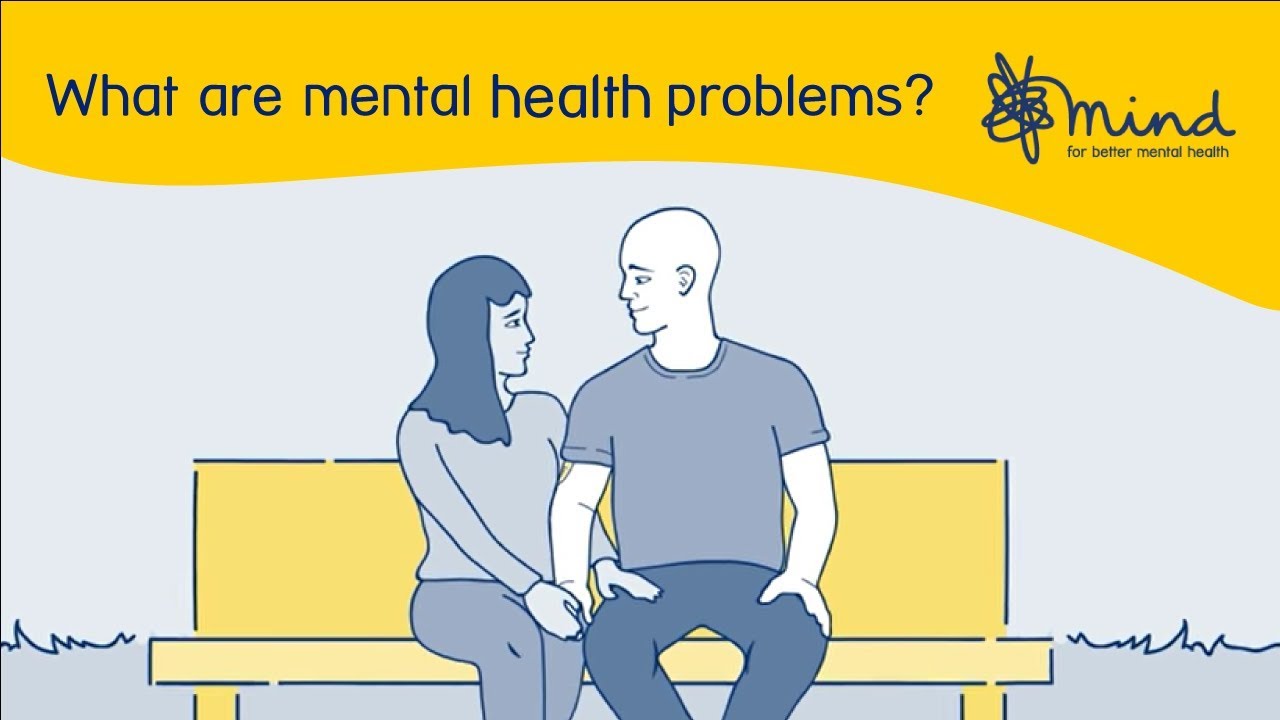Psychological Problems - Their Common Types And How To Effectively Deal With Them
A person's ability to think clearly, feel emotionally stable, and conduct themselves responsibly may all be negatively impacted by psychological problems. Both professional and private interactions may be impacted by mental illness. Your mental health may be treated with medication, therapy, or a combination of the two.
Author:Suleman ShahReviewer:Han JuJan 31, 20235 Shares290 Views

A person's ability to think clearly, feel emotionally stable, and conduct responsibly may all be negatively impacted by psychological problems. Both professional and private interactions may be impacted by mental illness. Your mental healthmay be treated with medication, therapy, or a combination of the two.
There is a vast variety of triggers for psychological problems. It's possible that there is a multifaceted set of elements at play for most individuals, but some may be more influential than others.
About one-quarter of the population may have mental healthissues in any given year. The list goes from the more frequent issues like depression and anxietyto the more extreme ones like schizophrenia and bipolar illness.
Anxiety, despair, rapid mood swings, lack of self-assurance, fear, wrath, rudeness, and irritability are all symptoms of the mental instability you're experiencing. All of these problems often emerge for no apparent cause. The issue arises and increases over time. Without prompt and proper treatment, it may also cause insanity.
Psychological Problems Types
Depression
Depression, which affects 300 million people, mostly affects women. It may cause loss of interest or pleasure, melancholy, guilt, poor self-esteem, problems sleeping, eating pattern changes, tiredness, and lack of focus. Depression is not caused by "too much" or "too few" brain chemicals, particularly serotonin. Genetics, lifeexperiences, medical issues, and drugs might cause it.
Depression may be long-term or reoccurring, which can hinder employment, education, and relationships. Depression may lead to suicide. Cognitive behavior therapy, psychotherapy, and antidepressants may help alleviate depression.
Anxiety
Anxiety affects 40 million individuals in the United States, or 18.1% of the population, every year, and it is typical for people with depression to also suffer from anxiety (and vice versa).
Anxiety disordersemerge from a combination of causes, including genetics, brain chemistry and life experiences, and although it is a highly curable condition, only 36.9 percent of persons who deal with anxiety really seek out therapy, and eventually, access it. Anxiety may be managed and treated with the aid of psychotherapy and medicines.
Bipolar Affective Disorder
This disorder affects 60 million individuals globally, causing manic and depressed periods that are sometimes book-ended and sometimes stabilized. Manic episodes may cause hyperactivity, irritability, self-esteem, and insomnia.
Hypomania is milder mania. Depression causes severe sorrow, despair, low energy, and insomnia. Medication and psychological assistance may treat bipolar, which is caused by hereditary, neurochemical, and environmental causes.
Schizophrenia And Other Psychoses
Psychoses, including schizophrenia, affect 23 million individuals worldwide and cause abnormalities in thought, perception, emotions, self-image, and behavior. These disorders may cause hallucinations and delusions in late adolescence or early adulthood, making employment, school, and socializing difficult.
Stigma and prejudice prevent many people with severe mental disorders from getting the health and social assistance (often leading to housing instability) they need to address their problem.
Dementia
Dementiais characterized by cognitive decline that goes beyond that expected with age and lasts for an extended period of time. Although a solution has not yet been discovered, palliative care may help reduce a patient's anxiety and discomfort as they wait for a potential cure. Recognizing your symptoms and getting a correct diagnosis may help doctors provide the most effective therapy.
Psychological Problems Symptoms
- You will lose focus in every endeavor.
- Everywhere you will experience confusion.
- The second is forgetting the most crucial stuff or everything.
- You will acquire apathy.
- You will be sad for a continuous-time without any proper reason.
- You will experience phobia in your head.
- You may always suffer anxiousness.
- In extreme circumstances, you may also acquire a personality problem.
- In extreme circumstances, you will also acquire suicidal impulses.

What are mental health problems?
Tips To Balance Your Psychological Problems
- Self-esteem:Avoid self-criticism. Spend time on hobbies and projects or explore new things. Do a daily crossword puzzle, garden, dance, play an instrument, or study a new language.
- Be healthy: Physical fitness improves mental wellness. Eat well, don't smoke, and drink plenty of water. Exercise reduces melancholy, anxiety, and improves spirits.
- Rest:College students are depressed due to sleep deprivation, according to research.
- Befriend excellent people: Family and social support make people healthy. Meet new people in a club, class, or support group or with supportive family and friends.
- Self-care: Help someone by volunteering. Helping others and meeting new individuals will make you feel wonderful.
- Manage stress: Stress is inevitable. Try One-Minute Stress Strategies, Tai Chi, exercise, nature walks, pet play, or journaling to relieve stress. Smile and perceive life's comedy. Laughter boosts immunity, reduces stress, and relieves pain.
- Relax: Try meditation, mindfulness, or prayer. Relaxation and prayer may boost your mood and attitude. Meditation has been shown to soothe and boost treatment.
- Goal-setting: Write out your academic, professional, and personal objectives and how to accomplish them. Be ambitious, but don't overbook. You'll feel great as you achieve your objective.
- Avoid monotony: Routines make us more efficient and safer, but a change of pace may brighten up a dull schedule. Change your running route, road trip, park stroll, picture hanging, or restaurant.
- Avoid drugs and alcohol:Reduce your alcohol intake and stay off narcotics. People often turn to booze and drugs as a kind of "self-medication," despite the fact that such substances really make matters worse.
- Get help when needed:Seeking assistance shows strength, not weakness. Remember that therapy works. Mental illness and addiction may be treated and lead to fulfilling lives.
Psychological Problems Homeopathy Treatment
Effective treatment for mental health issues with homeopathic remedies is possible. When it comes to medicine, homeopathy is all about going back to basics. Each of our remedies is packed with a wide variety of minerals and helpful plant extracts.
Each component is so potent that it may address the underlying cause of your condition. Homeopathy is effective not just for mild instances of anxiety or rage, but also for more extreme ones. Here are a few examples of effective homeopathic medications for dealing with mental health issues:
- Belladonna is a powerful remedy for mental health issues including hallucinations, insomnia, and anxiety.
- Cimicifuga is particularly effective in the treatment of depression.
- The use of sepia may help alleviate irrational fears. In addition to that, it might assist you overcome boredom.
- In cases of severe melancholy and persistent sorrow, nothing works better than aurum metallicum.
- Ignatia is prescribed to female patients with chronic depression.
- Both arsenicum and nux vomicaare effective treatments for male depression.
- Use Sulfur if you've experienced more widespread mental health issues including depression, despair, or memory loss.
- Phosphoricum acidum is helpful for treating mental drowsiness and memory loss.
- If you're feeling down in the dumps, give Pulsatilla a try.
- Another treatment for memory loss is an oriental plant called anacardium. In addition to this, it is effective in dealing with feelings of delusion, anger, sadness, and nervousness.
People Also Ask
What Are The Top Psychological Problems?
Anxiety disorders, unipolar depression, and bipolar disorder are among the most common mental health issues individuals face today. Some forms of dementia are more frequent among the elderly, and schizophrenia is also all too common.
What Is A Psychological Disorder?
Commonly known as mental or psychiatric illnesses, the phrase "psychological disorder" is occasionally used interchangeably. Mental diseases are characterized by recurrent patterns of psychological or behavioral symptoms that have far-reaching consequences.
What Are The Most Common Mental Health Problems?
In the United States, anxiety disorders are much more prevalent than any other kind of mental disease. According to their findings, 66.6% of people with anxiety disorders are never given a proper diagnosis and treatment.
What Is The Impact Of Mental Disorders On Society?
Consequences on health, society, human rights, and the economy have become more severe as a result of the prevalence of mental diseases in every region of the globe. One of the leading causes of disability across the globe is depression, a widespread mental condition.
Final Thought
Depression, anxiety, stress, psychosis, lack of sleep, and other factors have all been linked to the development of psychological diseases. The degree to which they manifest and the way in which they influence various individuals may vary widely.
If they get help quickly and put in the effort, many individuals with mental health issues may make a full recovery. Mental health issues are more widespread than most people realize, but fortunately, most can be effectively managed with appropriate care.
Because of the connection between your mental and emotional health, the psychological issue is directly related to them. Psychological problems may arise whenever there is a disruption in the typical functioning of the mind and emotions.

Suleman Shah
Author
Suleman Shah is a researcher and freelance writer. As a researcher, he has worked with MNS University of Agriculture, Multan (Pakistan) and Texas A & M University (USA). He regularly writes science articles and blogs for science news website immersse.com and open access publishers OA Publishing London and Scientific Times. He loves to keep himself updated on scientific developments and convert these developments into everyday language to update the readers about the developments in the scientific era. His primary research focus is Plant sciences, and he contributed to this field by publishing his research in scientific journals and presenting his work at many Conferences.
Shah graduated from the University of Agriculture Faisalabad (Pakistan) and started his professional carrier with Jaffer Agro Services and later with the Agriculture Department of the Government of Pakistan. His research interest compelled and attracted him to proceed with his carrier in Plant sciences research. So, he started his Ph.D. in Soil Science at MNS University of Agriculture Multan (Pakistan). Later, he started working as a visiting scholar with Texas A&M University (USA).
Shah’s experience with big Open Excess publishers like Springers, Frontiers, MDPI, etc., testified to his belief in Open Access as a barrier-removing mechanism between researchers and the readers of their research. Shah believes that Open Access is revolutionizing the publication process and benefitting research in all fields.

Han Ju
Reviewer
Hello! I'm Han Ju, the heart behind World Wide Journals. My life is a unique tapestry woven from the threads of news, spirituality, and science, enriched by melodies from my guitar. Raised amidst tales of the ancient and the arcane, I developed a keen eye for the stories that truly matter. Through my work, I seek to bridge the seen with the unseen, marrying the rigor of science with the depth of spirituality.
Each article at World Wide Journals is a piece of this ongoing quest, blending analysis with personal reflection. Whether exploring quantum frontiers or strumming chords under the stars, my aim is to inspire and provoke thought, inviting you into a world where every discovery is a note in the grand symphony of existence.
Welcome aboard this journey of insight and exploration, where curiosity leads and music guides.
Latest Articles
Popular Articles